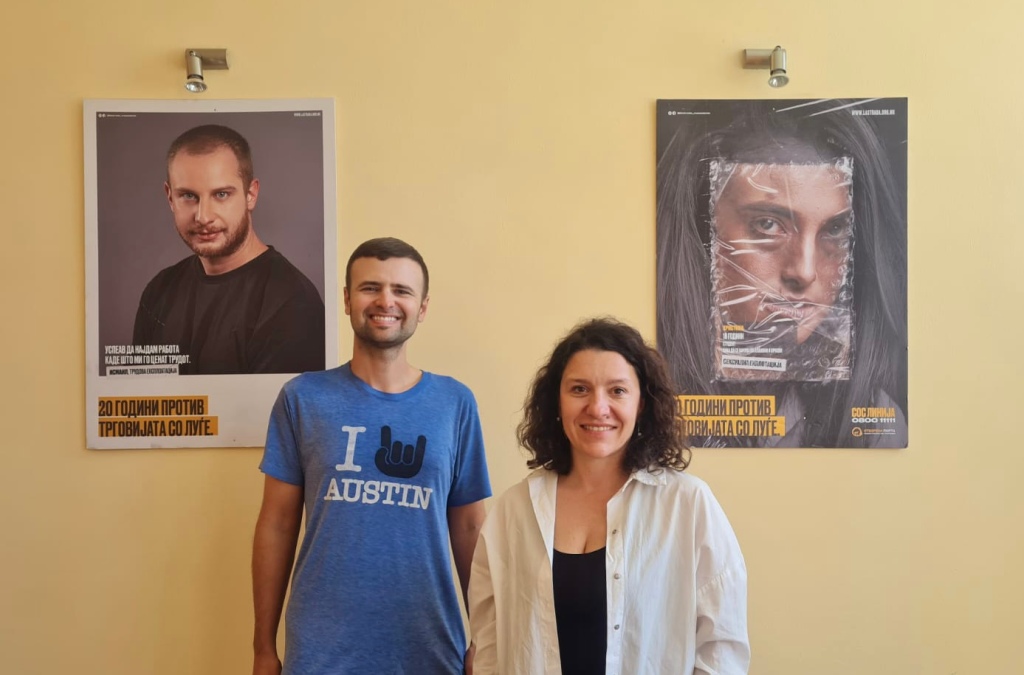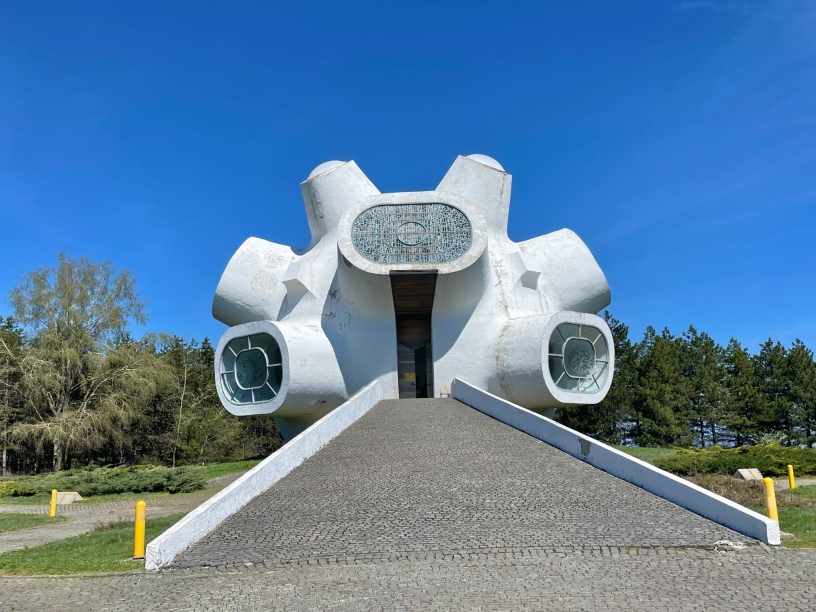I spent ten days exploring this little Balkan nation–summitting two epic mountain peaks, visiting three national parks, and seeing all the sights in the cities. While two months isn’t long enough for me in some countries, ten days was perfect for this one 🙂
Top Photo: Ilenden Monument, Krushevo
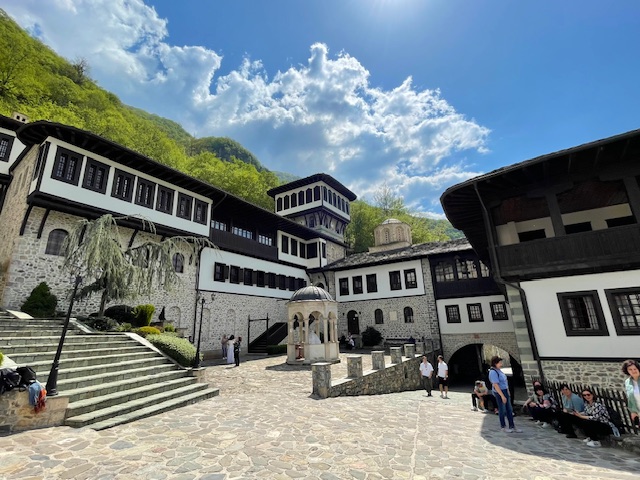
Destinations
Ohrid & Galičica National Park: A city with historic churches resting on a huge and impressive lake near a national park with prime mountain hiking
Bitola & Pelister National Park: A small but peppy city with ancient ruins lying below another mountainous national park
Prilep: A stunningly-set city below rocky hills with unique monasteries and monuments
Krushevo: A town perched on top of a mountain that was the origin of Macedonia’s independence monument and has the country’s most unique monument
Skopje: A capital city with super weird grand architecture & bridges sitting beneath a mountain
Manrovo National Park: A park centered around a large lake with impressive monasteries, churches, & tiny villages perched on hills
Tetovo: A majority ethnic Albanian city that’s home to the one-of-a-kind Colored Mosque
Kratovo: A little town with incredible historic Middle Age-era bridges that sits near a quirk of nature called The Stone Dolls
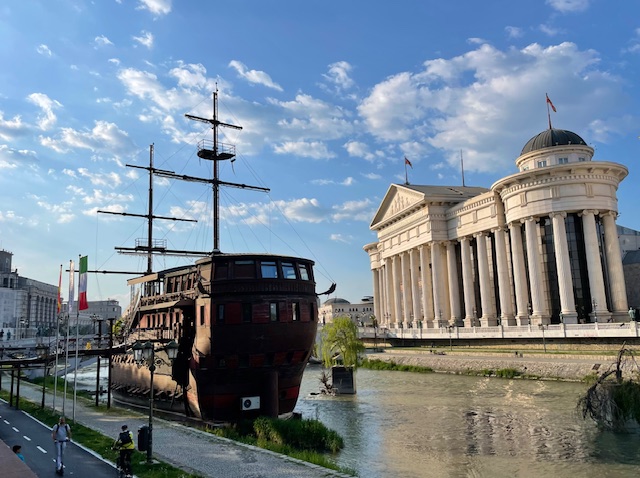
Some Stats
- North Macedonia boasts the most recent name change of any nation–it was called simply Macedonia until 2019.
- This change was done to remove Greek’s veto to North Macedonia joining the EU (which is still very much a work in progress due to corruption, other unhappy neighbors like Bulgaria, etc.). Greece has a large region that is also called Macedonia and they were very unhappy about Macedonia using the Macedonia name.
- Little Macedonia has only 1.8 million people, about the same as the Sacramento area
- More than 1/3 of Macedonians still live in villages
- North Macedonia is one of the least developed countries in Europe–it’s at about the same level of development as middle-income nations like Brazil & India (India is no longer a poor country! Seriously!)
- Macedonia has a huge ethnic Albanian minority that makes up 1/4 of the country’s population. Macedonians themselves are only 58% of the nation’s populace.
- A full one-third of Macedonians have moved out of the country, primarily to earn higher wages
- The US is the second most popular destination for Macedonian emigrants after Germany. Have you ever met a Macedonian?!
- Macedonia only gained independence in 1991 at the time of the breakup of Yugoslavia (more on this below)
- Macedonia’s neighbors Bulgaria, Serbia, & Greece have throughout recent history sought to deny the existence of a Macedonian ethnicity or nation and to dissolve Macedonia into their own nations. Greece was the most successful–a big chunk of mainland Greece is historical Macedonia and Greece ethnically cleansed the region of Macedonians to the point where it feels very Greek today.
- Mother Teresa is the most famous Macedonian of all time. She was an ethnic Albanian who was from Macedonia and there are homages to her all over the country.
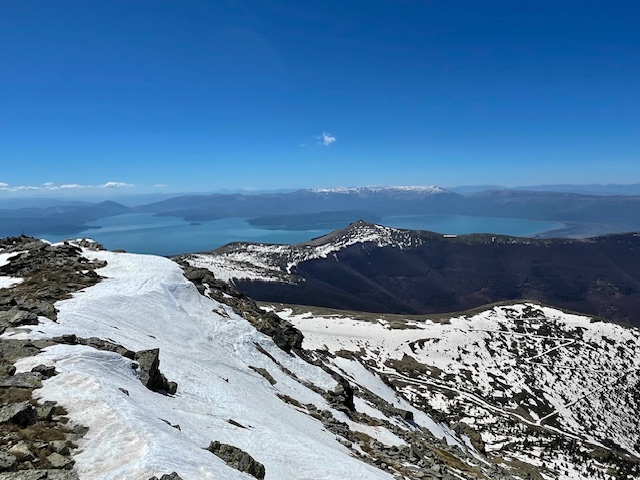
The “Summer House”
My Couchsurfing host in Prilep invited me to take a journey to see his summer house and said it would take about 15 minutes to get there, which seemed like a very short drive to go to a summer house. Then I was further surprised when he revealed that we could walk there in 15 minutes! His summer house is actually a property just outside the city limits. How’s that for a staycation?

Memories of Yugoslavia
As this is my first former Yugoslavian nation, I was very eager to hear locals’ perspectives on life in this former country. My same host in Prilep had a super friendly mom named Vesela who spoke a tiny bit of English but was eager to answer my questions about Yugoslavia.
- Yugoslavia was a socialist (aka communist) nation that included the territory of modern-day Serbia, Bosnia & Herzegovina, Montenegro, Slovenia, Croatia, & North Macedonia until it broke up in 1991 during a wave of anti-communist uprisings against the failure of socialism to provide economically for its people and due to some nations no longer needing or wanting to be dependent on Serb-dominated Yugoslavia
- Ironically, the economy got even worse in Macedonia after the end of socialism so Vesela remembers life under Yugoslavia as being very good and problem-free
- Life under socialism meant a dearth of options–fewer car models and colors to choose from, less variety of produce at the store, etc.
- I didn’t get to talk to Vesela about this, but I saw an Insta post a while back of 1970s-era Yugoslavians wearing sombreros & Mexican attire and learned that Yugoslavians became very interested in and passionate about Mexican culture during a multi-decade period when their dictator prohibited all external media except for Mexican telenovelas. Super cute…and way better than white Americans wearing sombreros on Cinco de Mayo 😉
- North Macedonia produces few of its own series today and today Vesela watches Turkish telenovelas, which are very popular here (and in many parts of the world, even Latin America)

Throwing Stones at the Gay Bar
I stopped by the office of a Macedonian org called Coalition MARGINS and had a charming chat with activist Stefan Bogeski to better understand queer life in North Macedonia.
MARGINS lives up to its name and services groups living on the margins of society, including LGBTQ folks but also HIV+ people, sex workers, drug users, and marginalized women. Their biggest event is an annual Pride festival which they’ve been hosting for 12 years and includes visual & performing art, lectures, and a party/concert (this year, featuring a queer rapper & a Roma singer who calls themself Gypsy). They also hosted a storytelling event titled “Shame on You,” in which folks spoke on and attempted to reclaim shameful experiences.
- Their first Pride Parade was in 2019 and they were gratified to see many allies of the community participate
- While Pride has thankfully remained violence-free, there were multiple instances of stones being thrown at queer-friendly bars (there are no gay bars in Macedonia), including once during a crowded party night 10 years ago. More recently, virulent homophobes have stopped by to yell slurs and threaten partygoers but have restrained themselves from violence.
MARGINS also focuses heavily on improving the situation for queer youth–advocating for LGBTQ-inclusive sex education and training teachers on how to protect and advocate for their queer students.
Finally, we spoke more broadly on queer issues in Macedonia:
- An LGBTQ-inclusive anti-discrimination law was passed in 2019 (a necessary prerequisite for EU membership, which N. Macedonia is very slowly moving toward), but enforcement is limited and it has major gaps, like not being applicable to universities
- A proposed gender equality law that would have granted trans and non-binary people the right to change their name and gender on their IDs without proof of surgery (along with broader gender equality policies like mandating equal pay) led to large-scale protests by the local Orthodox church and ultimately failed
- MARGINS helps trans and non-binary Macedonians safely access hormone and mental health treatment
- On the whole, few LGBTQ Macedonians are out, even to their close friends.
- There’s major anti-queer discrimination in the healthcare system–for instance, dentists regularly deny treatment to HIV+ clients
- There has yet to be an openly-queer Macedonian in political office, but MARGINS is partnering with the American org Victory Fund to field the country’s first queer candidates for upcoming elections
- There is, however, a interpartisan group of 10 parliamentarians who are allies and are part of an LGBTQ caucus
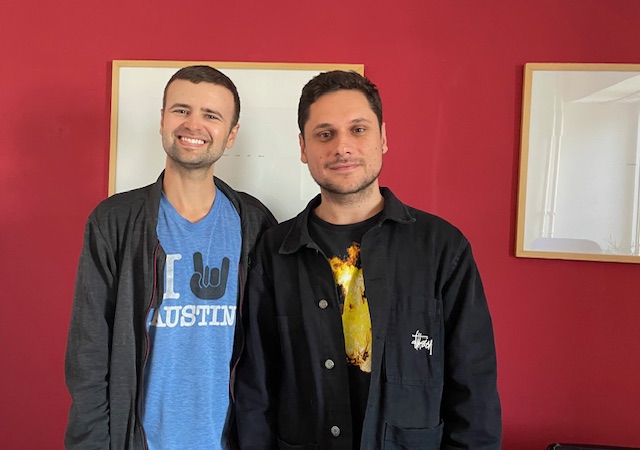
The Next Wave of Human Trafficking
On the same day, I visited Marija Todorovska at the Skopje office of Lastrada, an international org dedicated to prevention of human trafficking and support for its victims, to better understand the persistence of this practice in 2023 and to get a general sense of women’s issues in North Macedonia.
Human Trafficking
- Lastrada supports survivors of human trafficking through a 24/7 hotline, a shelter, and legal, housing, and medical support. Since the adjustment back into society after is so intense, they stay in touch with victims for 2+ years after initial contact–they even have one woman they worked with in 2007 that they remain in touch with.
- Most victims are aged 7-12 and Lastrada works about 10 of them each year–a relatively small number but they suspect that the true number of victims is far higher.
- Victims are often recruited with offers of well-paid jobs, assistance with visas for wealthy countries (or for North Macedonia in some cases). The process often starts with the trafficker forming a friendship or romantic relationship with the victim.
- In one recent case, a middle-class 9-year-old Macedonian girl was recruited via a fake social media profile and was blackmailed with the threat of nude photos she’d sent being shared with her parents if she didn’t do explicit acts on cam. (Lastrada worries that social media is the next horizon of human trafficking.) She unfortunately attempted suicide but survived and the 50-year-old perp was prosecuted.
- 40% of victims are recruited by someone within their own extended family
- Victims are often recruited with offers of well-paid jobs, assistance with visas for wealthy countries (or for North Macedonia in some cases). The process often starts with the trafficker forming a friendship or romantic relationship with the victim.
- The system is weaker for adult victims, who face the self-barriers of not seeing themselves as having experienced trafficking as well as stigma from society
- While forced sex work is common for female victims, male victims are often forced to commit criminal acts like drug dealing or robbery
Feminism in Macedonia
- Motherhood and wifehood are still seen by society as the most important roles for women and women who choose to prioritize differently are stigmatized
- Victims of sexual violence (including gang rape) are often blamed for the crime, especially if the perps are from “good families”
- A new gender and family violence law passed in 2021, making offenses like verbal & virtual violence and stalking criminal. Schools are now required to be safe spaces for victims to report violence.
- Due to a quota requirement, there is significant female representation in Parliament, but few of them prioritize women’s issues. There are currently two female candidates for President so it’s possible Macedonia will elect its first female President this year–but this is a country where the Prime Minister has power than the President.
